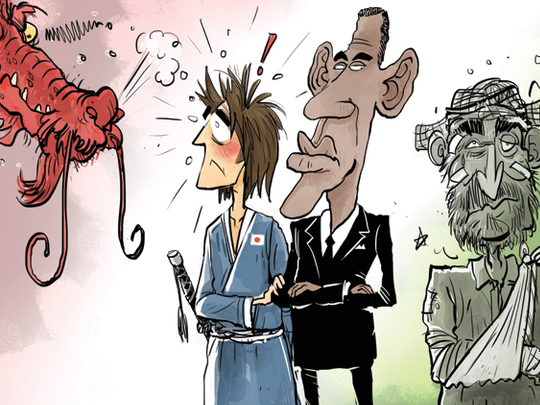
US President Barack Obama has just returned home after a week-long trip to Asia that included stops in Japan, South Korea, Malaysia and the Philippines. The broad purpose of the trip was to reassure long-time allies that America was still concerned about them and the region as a whole. Though China was not on Obama’s itinerary, it loomed over the trip — a presence in the background at every stop. It is China’s emergence as an economic and military power that Washington’s Asian allies fear. That fear, in turn, makes them eager to deepen ties with the US. In practical terms, this meant making Obama praise the friendship between the US and each of his Asian hosts.
He firmly took Japan’s side in a territorial dispute between Tokyo and Beijing, and, later, said: “We welcome the continuing rise of a China that is stable, prosperous and peaceful and plays a responsible role in global affairs.” It was a statement carefully calculated to offer friendship even as it conveyed a warning. In a bigger sense, the visit was supposed to send a message that the much discussed “Asia pivot” in American policy has not become a dead letter.
The Asia Pivot was a policy first announced by the Obama administration in 2012. Initially presented mainly as a Pentagon initiative focused on the long-term rethinking of where and how American power should be deployed overseas, it took on a less military and more diplomatic character in 2013 (i.e. once Obama was safely finished with his reelection campaign). At its most basic level, the “pivot” is an attempt to look forward and focus on a region that continues to grow both in terms of population and global economic importance. It was also a way of signalling that the American policy establishment did not want to be eternally bogged down in regions like the Middle East where it often seems like the same people are arguing about the same problems for decades, with little progress to show for it.
Even as a Middle East specialist writing in a Middle Eastern newspaper, I have to say I am sympathetic to this. I do not pretend to know a lot about Asia, but I completely understand the frustration and sense of futility that American policymakers (and journalists) often feel when dealing with places like the Balkans, Ukraine and, of course, the Middle East.
Hugely important trip
The problem is that being a global superpower means that one rarely gets to pick and choose among world crises. This is not to argue that Washington ought to intervene in every hot spot that pops up around the globe (though there are still people in the US capital who think that way). It is, however, an acknowledgement that whenever a crisis surfaces, one of the first questions everyone asks is what Washington thinks about it and what Washington plans to do. One need not favour American intervention to acknowledge that this happens.
That is why when Obama holds a news conference in Japan he gets asked about Ukraine. It is why he takes time out from his Asia trip to organise a conference-call with European heads of government to discuss relations with Russia.
It is also why, at the end of a hugely important Asia trip, Deputy National Security Adviser, Tony Blinken, went on NBC’s Meet the Press last Sunday and spent the entire interview answering questions about Russia, Ukraine and, yes, the Middle East.
This is not to say that the “Asia pivot” is a bad idea or that some reordering of priorities may not be in Washington’s long-term interests. It is a reminder that superpowers do not always get to pick the crises that come to dominate their attention and if one can say anything about the Middle East over the last century it is that the region has an uncanny ability to force the great powers of each succeeding generation to pay attention.
This is not about America’s relationship with Israel. Nor is it about the balance of interests that often seems to pit stability against democracy. It is not even about oil. It is about remembering that power is both a blessing and a burden.
Many in the Middle East may find it hard to believe, but the vast majority of Americans are tired of war and tired of military interventions on the other side of the world. Sometimes America blunders into conflicts it ought to have avoided, but when you are the world’s most powerful nation, everyone expects your government to have a position concerning every crisis large and small. That makes big, well-considered, changes to grand strategy easier to announce than to implement. It may annoy some people in the Pentagon and the White House, but it is not likely to change any time soon.
Gordon Robison, a longtime Middle East journalist and US political analyst, teaches political science at the University of Vermont.












